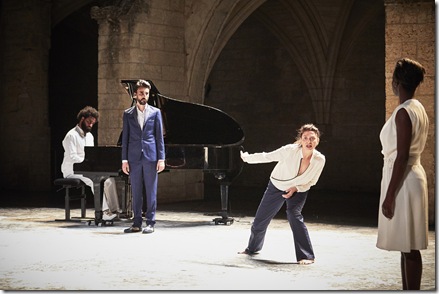Avignon. Dance poem by Radhouane El Meddeb: Face à la mer, pour que les larmes deviennent des éclats de rire.
Concept, dramaturgy, choreography Radhouane El Meddeb; Artistic collaboration Moustapha Ziane; Stage design Annie Tolleter; Music Jihed Khmiri, Production: La Compagnie de SOI; Tunis – Paris
A reflection on movement, music and chanting, this performance is about the pain of exile, the impossibility of return or of changing history. Radhouane El Meddeb, a Tunisian-French dancer and choreographer, dedicates his work to the people of Tunis, those who left and those who stayed behind. The central image is the sea towards which all the dancers’ gazes are directed. They come onstage, one by one, moving past each other, looking intensely at the audience, or rather at the sea.
In the first part of this one-hour show, there is not much action but rather tension and mistrust. The dancers move across the stage, stiffen their bodies, afraid to brush by each other, avoiding eye-contact. Their only point of connection is that sea, the gaze they cast towards the spectators. This sense of discomfort is transmitted to the audience as well: how do you react to action that is devoid of any internal movement?
Suddenly, the dancers approach the audience. They stand in line, remaining silent in a long and awkward pause. Some spectators begin to clap, some shift anxiously in their seats. As the uncertainty and pressure increase, one dancer breaks the silence. He falls into a frenzied trance, breaking the fear of expressing one’s emotions. As he performs his solo, breaking and crashing in front of us, the others keep their distance. They know – this is what happens if you give in to your pain or if you touch someone else’s agony.
This is as much an autobiographical representation of Radhouane El Meddeb’s personal exile as it is a historical requiem to the people of Tunis, their struggles and their revolution. It is also about the impossibility of return, once you leave your home, your culture, says the artist, there is no space for coming back. Face à la mer is El Meddeb’s gesture of return.
On stage, another dancer appears. She is performing a solo, screaming on the top of her lungs: “Je suis ici pas là; je suis là pas ici; mon histoire est ici; mon histoire est là. ”. She stops her screams with a simple movement: crossing the stage diagonally she tries to run left and right at the same time, the gesture of time standing still. She is not afraid of engaging the others. She runs from one dancer to the next, forcing each one to interact with her. Who is that woman? A revolutionary fighter who had to leave her country? The memory of the people? The mother who lost her child to the movement of history? All these questions and images float around, but are never clearly identified in the abstraction of this minimalist staging.
The last part begins with an interruption. A new dancer intervenes. He makes his angry demands in Arabic. As his speech remains untranslated, the audience is invited to create its own narratives of who this person is and what his demands are. Perhaps, he is another incarnation of the Tunisian people, their anger and their hopes.
The meaning of this speech remains less important than the intensity of the shouting itself. The monologue adds a new colour to this play’s sound scape, made through the music of a piano played by Jihed Khmiri and the chanting by Mohamed ali Chebil. The language – says Radhouane El Meddeb – is our experience, it is visceral not intellectual, and hence speaking is like music. We understand what other people say because we hear their voices, we follow the emotions carried by the voices, not the meanings that the linguistic structures produce.
The same experience takes place watching Face à la mer, we follow the emotion, the rhythm of this dance/poem, and we engage sensually with this music. The last image carries hope: the dancers form another line, they look at the audience, one by one they begin to smile, some are sitting down, some are curling up. The music stops. The lights are killed.
The audience rejoices and applauds. I remain pensive. I wish I could trust this last image, I could believe in the power of smiles and hope, at the end I’m on the road too. Something, however, tells me that optimism is tentative here, and the smiles are rather a bit odd. Something remains hidden and undecided, perhaps even dangerous, exactly as the title of this play says: Facing the sea for tears to turn into laughter.
20 – 25, July 2017
With Sondos Belhassen, Houcem Bouakroucha, Hichem Chebli, Youssef Chouibi, Feteh Khiari, Majd Mastoura, Malek Sebai, Malek Zouaidi
And Mohamed Ali Chebil (singing), Jihed Khmiri (piano)
CLOÎTRE DES CARMES
Interview with Radhouane El Meddeb is here: file:///C:/Users/Ready2Go/Downloads/46_en_face%20a%20la%20mer.pdf
